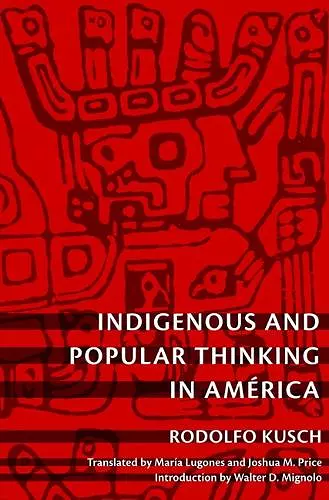Indigenous and Popular Thinking in América
Exploring Indigenous Knowledge Systems in a Colonial Context
Rodolfo Kusch author Joshua M Price translator María Lugones translator
Format:Paperback
Publisher:Duke University Press
Published:7th Apr '10
Currently unavailable, and unfortunately no date known when it will be back

This work by Rodolfo Kusch explores the undervalued indigenous and popular ways of thinking in the context of colonialism and modernity.
Originally published in Mexico in 1970, Indigenous and Popular Thinking in América marks the first English translation of Rodolfo Kusch's influential work. The Argentine philosopher delves into the impact of colonization on indigenous and popular thought, emphasizing the stark contrast between European rationalities and the rich, often overlooked, modes of thinking rooted in indigenous cultures. Kusch argues that this binary opposition has led to a misunderstanding and devaluation of indigenous practices among urban Argentines, including leftist intellectuals who often fail to appreciate these alternative ways of knowing.
Kusch's methodology resembles ethnography as he immerses himself in the lives of indigenous peoples and mestizos across Peru, Bolivia, and Argentina. He engages with them through conversations about agricultural practices, economic choices, and cultural rituals. By documenting these interactions, Kusch provides insights into the spiritual and practical significance of indigenous talismans, the arrangements of sacred spaces, and the wisdom of shamans. Rather than presenting a dichotomy of 'them' versus 'us,' he invites readers to consider a different framework that transcends Western social science and philosophy.
In the introduction, Walter D. Mignolo contextualizes Kusch's work within Argentine history and its relevance to contemporary discussions on subaltern studies and decoloniality. Indigenous and Popular Thinking in América serves as a vital exploration of indigenous thought, offering a fresh perspective on the complexities of identity, culture, and knowledge in a post-colonial landscape.
“[I]ndispensable reading for all scholars and students of the question of cultural encounters, the construction and deployment of the other, the struggle and constitution of different and competing epistemologies, and the setting up of the coloniality of power/knowledge. . . . [E]xtensively
researched and carefully thought out . . . make[s] an enormous contribution
to our knowledge and understanding of the Andean post-colonial world and
the processes of subject formation that ensued from the conquest to this day.”
- Sara Castro-Klarén, MLN
“This translation of one of Rodolfo Kusch’s most important works marks a significant step in the energetic conversation that has emerged over the last decade among postcolonial, indigenous, and Latin American studies. A translation of Kusch’s work has been sorely needed, both to complement the writing of scholars including Walter D. Mignolo, who have drawn from and discussed Kusch, and to stand alongside translations of books by other Latin American and Caribbean intellectuals including Édouard Glissant, Fernando Ortiz, and Enrique Dussel.”—Michael Hames-García, author of Fugitive Thought: Prison Movements, Race, and the Meaning of Justice
“Indigenous and Popular Thinking in América is a superior work by Rodolfo Kusch, and María Lugones’s and Joshua M. Price’s superb translation is a major contribution to English-language philosophy. Kusch’s book operates on many levels, as a post-Heideggerian phenomenology of culture, an existential analysis, and a sustained reflection on Otherness.”—Mario Sáenz, author of The Identity of Liberation in Latin American Thought
“[I]ndispensable reading for all scholars and students of the question of cultural encounters, the construction and deployment of the other, the struggle and constitution of different and competing epistemologies, and the setting up of the coloniality of power/knowledge. . . . [E]xtensively researched and carefully thought out . . . make[s] an enormous contribution to our knowledge and understanding of the Andean post-colonial world and the processes of subject formation that ensued from the conquest to this day.” -- Sara Castro-Klarén * MLN *
ISBN: 9780822346418
Dimensions: unknown
Weight: 454g
296 pages